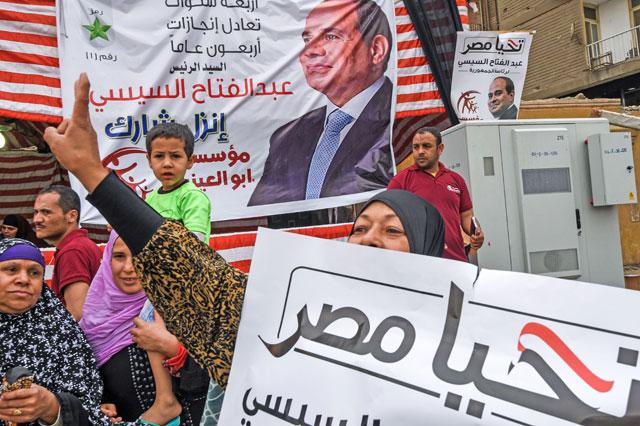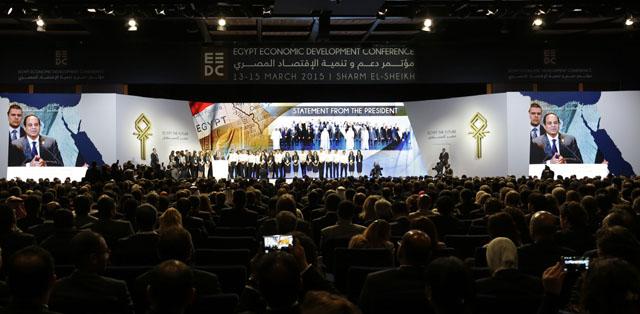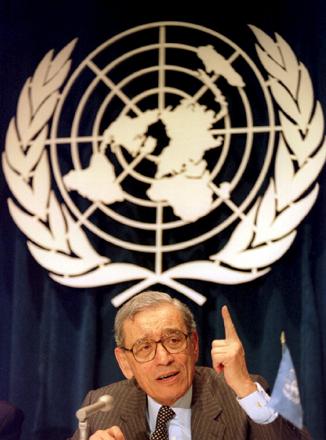You are here
Citing stability and reforms, big businesses in Egypt cheer for Sisi
By Reuters - Mar 29,2018 - Last updated at Mar 29,2018

An Egyptian woman flashes the victory gesture while holding a poster for incumbent President Abdel Fattah Al Sisi outside a polling station in the capital Cairo's western Giza district on Wednesday, on the third day of the 2018 presidential elections (AFP photo)
CAIRO, Egypt — Critics see him as an autocrat. The poor and middle class criticise his economic reforms. But one community of Egyptians — big business — is much happier with President Abdel Fattah Al Sisi as he heads for a second term after this week's election.
Businessmen say tough economic reforms, political stability and new infrastructure over the past four years have helped their companies recover from a slump caused by a 2011 uprising.
"He has taken bold and difficult decisions and needs the second term to conclude these steps," said billionaire Naguib Sawiris, with interests from telecommunications to gold mining.
He cited stability and security provided by the Sisi administration as factors that have helped boost growth.
Egypt's economic growth slowed after the 2011 uprising that toppled Hosni Mubarak as tourists and investors fled, but sweeping reforms tied to a $12 billion International Monetary Fund deal signed in 2016 have paved the way towards more growth.
Foreign reserves have more than doubled and investors are returning. Reforms included a currency devaluation, subsidy cuts and tax hikes to reduce the budget deficit.
"Floating the pound has been the best thing that happened in the company's history," said Wael Hamdy, vice president of Elsewedy Electric, the Middle East's biggest cable maker. Hamdy said development in infrastructure had also helped attract investment and create thousands of jobs.
"Until 2014, foreign companies were pulling out of Egypt because of poor infrastructure, but every day now we're meeting lots of investors who are interested in doing business in Egypt," he said.
Tourists
The reforms have not pleased everyone. Unlike wealthy businessmen, the majority of Egyptians have seen their purchasing power diminish since the country signed the IMF deal.
Also, many investors and economists worry that the army is becoming too involved in massive infrastructure projects and in other ventures, threatening to crowd out the private sector.
Businessmen also complained that high interest rates made it difficult to expand. Egypt has raised key interest rates by 7 percentage points to combat inflation, although last month it began cutting them.
But in a positive sign, tourists who had stayed away after the uprising and then fled in even greater numbers after a Russian plane was blown up over Sinai in 2015, have now begun returning.
Mohab Ghali, Hilton vice president for Egypt and North Africa, said stability provided by the Sisi administration was behind the recovery in tourism, which suffered badly after the Russian airliner was downed.
"We're seeing new hotels pop up every day which means there's stability," said Ghali. "We're seeing it in the increased numbers of tourists too."
The number of foreigners visiting Egypt jumped 54 per cent to 8.3 million in 2017, and receipts more than doubled to $7.6 billion.
Inflation shot up after the country concluded the IMF agreement in November 2016, reaching a peak of 33 per cent in July on the back of energy subsidy cuts. This squeezed already vulnerable citizens.
Poverty has risen and unemployment is not going down as quickly as people had hoped.
Sisi needs a large turnout to show he has legitimacy to push ahead with austerity.
The former general gained popularity after he led the army in ousting Islamist president Mohamed Morsi in 2013. His popularity has dimmed since then amid austerity and a crackdown on dissent. But he still has backers.
"I am a strong supporter of president Sisi. He has shown tremendous commitment to economic reform by taking courageous decisions without regard to his popularity," said Raouf Ghabbour, chairman and CEO of GB Auto, Egypt's biggest car assembler.
Related Articles
President Abdel Fattah Al Sisi was so confident after Egypt signed billions of dollars of deals at an investment summit that he publicly joked on Sunday about haggling with the world's top chief executives. Yet the real challenge has only just begun.
In his first 100 days in office, Egyptian President Abdel Fattah Al Sisi has made a fast start on economic reform: slashing costly fuel subsidies, raising taxes and devising infrastructure projects to secure long-term revenues and ease unemployment.
UNITED NATIONS — Former UN Secretary-General Boutros Boutros-Ghali, a blunt-spoken Egyptian who led the world body through global turmo
















